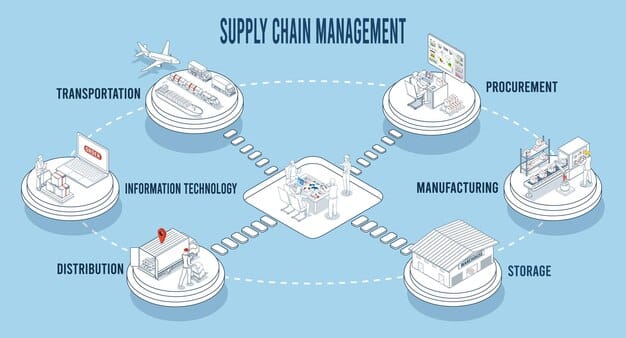New Sanctions: Impact on US Trade & Global Entities

The recent imposition of new sanctions on foreign entities significantly reshapes the landscape of US trade, forcing American businesses to navigate complex compliance demands and adapt to altered international market dynamics that impact supply chains and profitability.
The global economic stage is perpetually shifting, influenced by geopolitical tensions and strategic policy maneuvers. A recent development, the imposition of new sanctions on foreign entities: impact on US trade, represents a pivotal moment, demanding immediate attention and thorough analysis from businesses, policymakers, and the wider public alike. This complex interplay of international law and economic leverage directly affects America’s commercial interests and its intricate relationships across the world.
Understanding the Mechanics of Sanctions
The imposition of economic sanctions is a potent foreign policy tool, designed to pressure targeted regimes, entities, or individuals into altering their behavior. These measures can range from financial restrictions and trade embargoes to travel bans and asset freezes. For the United States, sanctions are often administered by bodies such as the Department of the Treasury’s Office of Foreign Assets Control (OFAC), alongside the Department of State and the Department of Commerce. Their primary objective is to advance national security and foreign policy goals without resorting to military action, yet their economic repercussions are far-reaching and often unintended.
Types of Sanctions
* Comprehensive Sanctions: These are broad measures that prohibit nearly all economic activity with an entire country or region. Historically, examples include sanctions against Cuba or Iran, though their scope can vary.
* Targeted Sanctions: More precise in nature, these focus on specific individuals, entities, or sectors within a country. They aim to minimize humanitarian impact while maximizing pressure on the specific targets responsible for undesirable actions.
* Sectoral Sanctions: These restrict access to financing or technology for specific sectors, such as energy, finance, or defense, particularly in countries deemed adversaries.
The rationale behind the latest wave of sanctions is multifaceted, rooted in ongoing geopolitical challenges such as cybersecurity threats, human rights concerns, and perceived geopolitical aggression. These actions are often the culmination of intricate intelligence gathering and policy deliberations, reflecting a strategic calculus intended to project power and enforce international norms. However, they also carry the inherent risk of collateral damage, impacting innocent populations and legitimate businesses caught in the crossfire. The precision, or lack thereof, in their design dictates the extent of this broader impact, making their meticulous formulation an imperative.
Immediate Repercussions for US Businesses
The moment new sanctions are announced, US businesses face a cascade of immediate challenges. The first and foremost is the imperative of compliance. Ignorance of sanctions law is no defense, and violations can lead to severe penalties, including hefty fines and even criminal prosecutions. Companies must swiftly identify if their existing contracts, supply chains, or financial transactions involve the newly sanctioned entities or regions. This often necessitates a rigorous internal audit, a process that can be resource-intensive and disruptive.
Supply Chain Disruptions
* Diversification Costs: Businesses may need to find alternative suppliers or markets, which can entail significant costs and time. Rerouting logistics, vetting new partners, and renegotiating contracts all contribute to increased operational expenses.
* Increased Lead Times: New supply routes might be longer, leading to delays in production and delivery. This can impact customer satisfaction and market competitiveness.
* Quality Control Challenges: Shifting to new suppliers always brings the risk of inconsistent quality, requiring more stringent — and costly — quality assurance processes.
Beyond direct compliance, the ripple effects permeate various aspects of business operations. Financial institutions, in particular, face heightened scrutiny as they are often the gatekeepers of international commerce. They must enhance their due diligence processes, screening transactions meticulously to prevent illicit financial flows or dealings with sanctioned parties. This added layer of compliance can slow down transactions and increase banking fees for legitimate businesses. For American exporters, the closure of previously viable markets translates directly into lost sales opportunities. Businesses that had invested in these foreign markets, perhaps establishing local operations or partnerships, may face significant write-downs and strategic pivots, sometimes even requiring a complete withdrawal, incurring substantial losses.

Impact on International Trade Dynamics
The repercussions of new sanctions stretch far beyond the immediate targets and the sanctioning nation, fundamentally altering international trade dynamics. When the US, a major global economic power, imposes sanctions, it creates a powerful deterrent effect, often referred to as “chilling.” Other countries and entities, fearing secondary sanctions or reputational damage, may reduce their dealings with sanctioned parties, even if they are not legally bound by the US measures. This phenomenon can lead to a fragmentation of global trade, as countries and businesses gravitate towards alternative arrangements and trade blocs.
One significant effect is the potential for trade diversion. Goods and services that can no longer flow to or from sanctioned entities via traditional routes often seek alternative channels, sometimes through third-party countries or illicit networks. This can create new, less transparent trade patterns, making it harder to track global commodity flows and potentially leading to unintended beneficiaries. Moreover, the long-term impact includes a potential shift in global economic alliances. Countries that feel disproportionately affected by US sanctions, or those that wish to challenge US economic dominance, may actively seek to strengthen alternative financial systems and trading partnerships, fostering the rise of parallel economic structures. This geopolitical chess game transforms global commerce from a purely economic endeavor into a strategic battleground.
Challenges and Opportunities for Non-US Entities
* Increased Uncertainty: Even for non-US entities, navigating the complex web of US sanctions can be daunting, leading to a more conservative approach to international transactions.
* Market Vacuums: For some, sanctions create opportunities to fill the void left by departing US companies, though this comes with inherent risks.
* Pressure to Choose Sides: Non-US companies often find themselves under implicit pressure to align with US policy or risk alienating a significant market.
The evolving landscape also presents a nuanced challenge to multilateral trade protocols. International bodies and agreements, once seen as bedrock principles for global commerce, are increasingly strained by unilateral sanction regimes. This can erode trust in established norms and make it harder to achieve consensus on global economic issues, further fragmenting the international trading system. The long-term implication is a less predictable and potentially more volatile global trade environment, where geopolitical considerations increasingly trump purely economic efficiencies.
Financial Sector Adjustments and Compliance Burden
The financial sector bears a particularly heavy load when new sanctions are implemented. Banks, investment firms, and payment processors act as the frontline defenders against illicit financial flows and sanctions evasion. The immediate adjustment involves updating sophisticated screening software to incorporate new lists of sanctioned individuals and entities, cross-referencing vast databases of transactions against these updated lists. This isn’t a mere technical update; it requires significant human oversight and the continuous training of compliance officers to navigate the nuances of evolving regulations.
The burden extends to “know your customer” (KYC) and anti-money laundering (AML) protocols. Financial institutions must enhance their due diligence on clients, especially those engaged in international trade, to ensure they are not inadvertently facilitating transactions that violate sanctions. This can lead to increased processing times for international payments and a rise in administrative costs, which are inevitably passed on to customers. Furthermore, the risk of “de-risking” emerges, where banks proactively sever ties with entire categories of clients or specific regions deemed too high-risk for compliance, regardless of the clients’ individual compliance status. While intended to mitigate risk, de-risking can inadvertently stifle legitimate trade and financial inclusion in certain areas.
Technological Innovation in Sanctions Compliance
* AI and Machine Learning: Advanced analytics are being deployed to detect patterns that might indicate sanctions circumvention.
* Blockchain Implications: The distributed ledger technology presents both challenges and potential solutions for tracking financial transactions, though its regulatory framework is still evolving.
* Automated Reporting Systems: Tools that streamline the reporting of suspicious activities to regulators are becoming essential.
Moreover, global financial institutions, particularly those with a significant presence in the US or dealing in US dollars, often adopt a “US-centric” approach to compliance. This means they apply US sanctions rules globally, even in jurisdictions where local laws might differ, simply to avoid the severe penalties associated with non-compliance in the US market. This extraterritorial reach of US sanctions can create friction with other nations and complicates the landscape of international finance, prompting discussions about alternative currencies for global trade and the development of non-dollar denominated payment systems to reduce reliance on the US financial infrastructure. The financial sector effectively becomes a critical, albeit sometimes reluctant, instrument of foreign policy.
Strategic Responses and Future Outlook for US Trade
As the dust settles from the immediate imposition of new sanctions, US businesses are compelled to formulate strategic responses that safeguard their interests and position them for future growth. The overarching theme is resilience and adaptability. Diversifying supply chains, as previously mentioned, moves from a reactive measure to a proactive strategy. This includes exploring sourcing from a wider range of countries, investing in domestic production capabilities, and even stockpiling critical components to mitigate future disruptions. Investment in robust geopolitical risk assessment capabilities becomes paramount, enabling companies to anticipate future sanctions or trade restrictions and plan accordingly. This requires not just economic analysis, but a deep understanding of political developments, human rights issues, and technological advancements that could trigger future sanctions.
Furthermore, there is a growing emphasis on re-evaluating market strategies. Some businesses may need to pivot away from heavily sanctioned regions and instead focus on emerging markets that offer more stable and predictable regulatory environments. This could involve new market entry research, localized product development, and building new distribution networks. For those heavily invested in affected regions, the option of divestment, though painful, might become a strategic necessity, balancing long-term viability against short-term losses.
Government and Industry Collaboration
* Public-Private Dialogues: More frequent and structured communication between government agencies and industry leaders can help shape more effective and less disruptive sanctions policies.
* Industry Best Practices: Trade associations can develop and disseminate best practices for navigating complex sanctions regimes.
* Advocacy for Mitigating Measures: Businesses can lobby for specific carve-outs or licensing provisions that protect legitimate humanitarian or commercial activities.
The future outlook for US trade in a world increasingly shaped by sanctions is one of continuous evolution. While the immediate goal of sanctions is behavioral change in targeted entities, their broader impact is accelerating a re-evaluation of globalization itself. Companies and governments are increasingly considering “friend-shoring” or “ally-shoring,” prioritizing trade relationships with politically aligned nations to enhance supply chain security and reduce geopolitical risks. This move towards more resilient, if potentially less efficient, global trade networks suggests a future where geopolitical alignment plays as significant a role as pure economic advantage. The era of frictionless global trade, driven solely by cost efficiencies, appears to be yielding to a new paradigm of strategic resilience and geopolitical alignment, fundamentally reshaping the global commercial landscape.

Legal Framework and Enforcement Mechanisms
The legal framework underpinning US sanctions is complex, drawing authority from various statutes, executive orders, and international resolutions. Key legislation includes the International Emergency Economic Powers Act (IEEPA), which grants the President broad powers to regulate international commerce in response to national emergencies, and the Magnitsky Act, focusing on human rights abuses. This intricate legal tapestry empowers agencies like OFAC to designate individuals and entities for sanctions and to enforce compliance rigorously. Enforcement mechanisms are multifaceted and include investigations, subpoenas for information, administrative fines, and, in severe cases, criminal prosecutions against individuals and corporations. The Department of Justice (DOJ) often partners with OFAC in these criminal enforcement actions, emphasizing the seriousness with which violations are treated.
Beyond direct enforcement, informational tools play a crucial role. OFAC maintains various lists, such as the Specially Designated Nationals and Blocked Persons (SDN) List, which are publicly available and constantly updated. These lists serve as essential references for businesses and financial institutions to identify sanctioned parties. Furthermore, OFAC issues specific general licenses that permit certain activities that would otherwise be prohibited, and interpretive guidance documents to clarify aspects of the regulations. This combination of statutory authority, proactive enforcement, and transparent informational resources forms the backbone of the US sanctions regime, aiming to deter illicit activities and ensure compliance within the intricate web of global trade.
International Cooperation and Divergence
* Allied Alignment: The US often seeks to coordinate sanctions with key allies (e.g., EU, UK, Canada) to amplify their impact and broaden their reach.
* Unilateral US Actions: At times, US sanctions may operate unilaterally, leading to friction with other nations whose policies or economic interests diverge.
* Challenges in Enforcement across Jurisdictions: Enforcing sanctions across different legal systems and with varying levels of political will presents ongoing challenges.
The extraterritorial application of US sanctions, particularly regarding the use of the US dollar in international transactions, is a contentious aspect of the enforcement regime. Non-US entities that engage in transactions subject to US jurisdiction, even if their primary operations are outside the US, can still face penalties. This has led to historical legal battles and significant fines against foreign companies and banks, underscoring the broad reach and assertive nature of US sanctions enforcement. This asserts the principle that using the US financial system implies adherence to US legal standards, regardless of geographic location.
Preparing for a Sanctioned Future
In a geopolitical landscape where sanctions are increasingly used as a primary foreign policy tool, proactive preparation is no longer an option but a necessity for US businesses engaged in international trade. The first step involves robust diligence and compliance infrastructure. This means not just reacting to new sanctions announcements but having systems in place that can rapidly adapt. Implementing advanced compliance software, regularly auditing third-party relationships, and continuously training staff on the latest regulations are essential. Companies should also develop a “sanctions playbook” – a pre-defined set of procedures for how to react to new sanctions, including communication strategies with partners, customers, and regulators.
Scenario planning is another critical component of preparation. Businesses should run “what-if” exercises to assess their vulnerability to potential future sanctions targeting specific countries, sectors, or commodities. This includes mapping their entire supply chain to identify single points of failure or dependencies on high-risk jurisdictions. By understanding potential exposures, companies can pre-emptively diversify their sourcing, explore alternative markets, or develop contingency plans for maintaining business continuity. This strategic foresight allows for a more agile response when the unpredictable happens, minimizing potential disruptions and financial losses.
Building Resilience and Agility
* Diversification Beyond Borders: Actively seeking a broader network of suppliers and customers across diverse geopolitical landscapes.
* Enhanced Data Analytics: Leveraging big data and predictive analytics to forecast geopolitical shifts that could lead to new sanctions.
* Legal and Consulting Partnerships: Establishing relationships with expert legal counsel and trade consultants specializing in sanctions to navigate complex landscapes.
Furthermore, fostering strong relationships with government agencies, industry associations, and legal experts can provide invaluable insights and support. Active participation in industry dialogues concerning sanctions policy can help shape more effective and less burdensome regulations, ensuring that the voice of the business community is heard. Ultimately, preparing for a sanctioned future means embedding a culture of geopolitical awareness and risk management throughout the organization. It’s about moving beyond mere compliance to strategic resilience, ensuring that businesses can not only survive but thrive in an increasingly complex and interconnected global economy. This continuous vigilance and adaptation are the cornerstones of success in this evolving international trade environment.
| Key Point | Brief Description |
|---|---|
| 🔗 Compliance Burden | US businesses face immediate and complex compliance requirements to avoid severe penalties. |
| ✈️ Supply Chain Shocks | Disruptions necessitate costly alternative sourcing and increased lead times. |
| 💸 Financial Sector Strain | Banks enhance due diligence, leading to slower transactions and higher fees. |
| 🔮 Strategic Adaptation | Businesses must diversify, embrace scenario planning, and foster resilience in trade. |
Frequently Asked Questions on Sanctions and US Trade
US sanctions primarily aim to influence the behavior of targeted foreign governments, entities, or individuals to align with US national security and foreign policy objectives. This can range from countering terrorism and nuclear proliferation to promoting human rights and democratic governance, typically as an alternative to military intervention.
New sanctions directly impact US businesses by necessitating immediate compliance reviews, potentially disrupting existing supply chains, limiting access to certain markets, and increasing operational costs due to enhanced due diligence and the search for new partners. Non-compliance can lead to severe fines and legal penalties.
Yes, non-US companies can be affected by US sanctions, particularly through secondary sanctions. These apply when foreign entities engage in certain prohibited transactions with sanctioned parties, especially if those transactions involve the US financial system or US-origin goods/services. This extraterritorial reach often compels global adherence to US regulations.
“De-risking” refers to financial institutions proactively severing relationships with clients or entire regions deemed high-risk for sanctions compliance. While a risk mitigation strategy, it can be problematic as it may inadvertently cut off legitimate businesses and individuals from essential financial services, hindering real economic activity and financial inclusion.
US businesses can prepare by building robust compliance infrastructures, diversifying supply chains to reduce reliance on high-risk areas, engaging in scenario planning for potential future sanctions, and maintaining open dialogue with government agencies. Developing a culture of geopolitical awareness and risk management is crucial for long-term resilience.
Conclusion
The relentless wave of new sanctions imposed on foreign entities undeniably casts a long shadow over the landscape of US trade, compelling businesses to navigate an increasingly complex and volatile global environment. From the immediate burdens of compliance and the painful disruptions to established supply chains to the broader shifts in international trade dynamics and the heightened scrutiny on the financial sector, the ripple effects are profound and far-reaching. Yet, amidst these challenges, there lies an imperative for strategic adaptation and resilience. The future of US trade hinges on businesses’ ability to not only understand and meticulously adhere to these evolving regulations but also to ingeniously pivot, innovate, and fortify their operations against an unpredictable geopolitical backdrop. This ongoing dance between policy, commerce, and global relations will continue to define the contours of international business.





